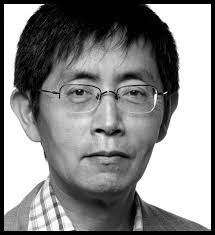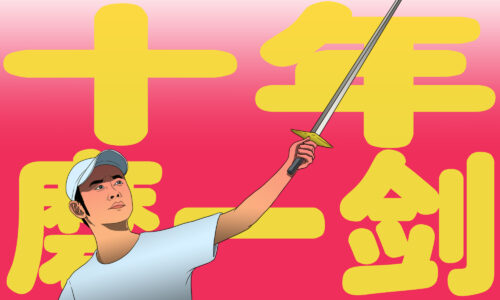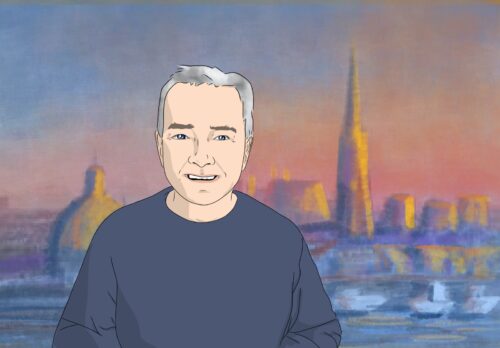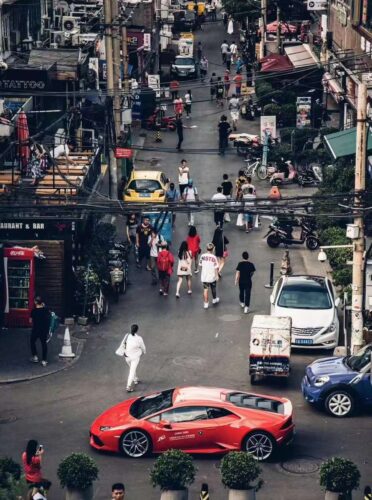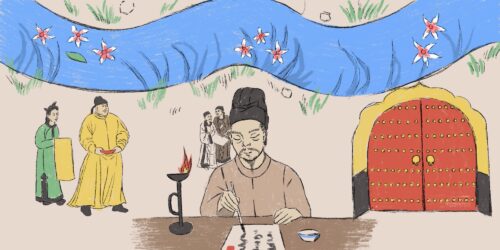Bei Dao and his enduring cynicism
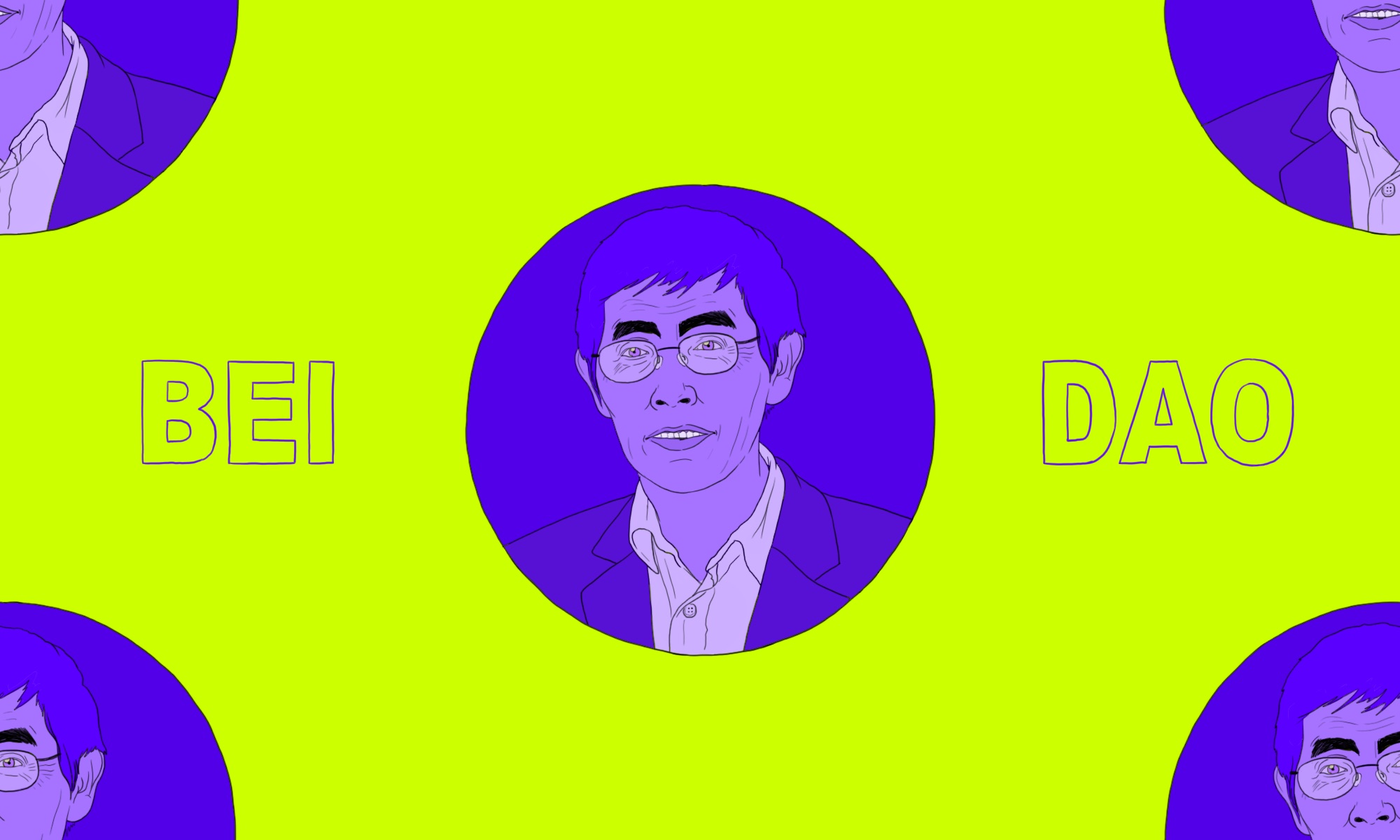
April is National Poetry Month, and to commemorate, we’ve been taking a look at famous Chinese poets in our Chinese Lives series.
The year was 1978, and China was waking from a nightmare. Chairman Mao and the Gang of Four were gone. With the Cultural Revolution retreating into the past, the country was looking to the future.
A new generation of poets was ready to capture the mood. Two men cycled through the streets of Beijing, pasting 60 large pages of print onto the fronts of publishing houses, universities, and the so-called “Democracy Wall” (a site where public grievances for the Cultural Revolution were aired). They were co-founders of a new magazine called Today (今天 jīntiān), which reclaimed poetry from propaganda fodder to a voice of tender self-expression. One of the men doing the pasting was Zhào Zhènkāi 赵振开, better known by his pen name, Běi Dǎo 北岛 — considered by some to be the greatest poet of this literary renaissance.
Who is Bei Dao?
Although a hushed, soft-spoken man, Bei Dao was loud and bold in his verse. Although he dislikes being put in a group (hence his pen name, the isolated “North Island”), he is an integral part of the “misty” (朦胧 ménglóng) poets. Although little-known in China today — he was banned from reentering the country after the Tiananmen crackdown in 1989 — his verses are still a voice against injustice.
Bei Dao was born in 1949, the year of the foundation of the People’s Republic, rubbing shoulders at school with the children of the country’s political elites. In 1966 he joined the Red Guard, excitedly taking part in forced public shavings of “dissidents,” denouncing his teachers and combing libraries for books on revolution.
But during 1967-68, the government reined in and disbanded the rabid Red Guard. From 1969, Bei Dao was a humble construction worker, mixing concrete for the next decade. Living among the poor, he was dismayed at their lives of squalor, far removed from stories of abundance he had been hearing in the Red Guard. “In a sense we were at the top of society,” he has said in one interview. “All of a sudden, we saw the bottom of society, the reality of most people’s lives, and it was a complete contradiction to everything I had experienced before.”
Doubt set in. He started meeting friends in secret to discuss books on anything they could get their hands on. It was for these friends that he quietly started writing the poetry that would capture the mass disillusionment of 1976.
His poems took a sledgehammer to the poetry of the past 30 years. Verses from the Mao era shouted about the glories of the Chairman, Communism, and the revolution. Like all other artforms, verse was meant to be a tool, a way to yell your slogans to the people. Writing about private emotions was indulging in capitalist individualism, in a society where even love letters were signed “I salute you with revolutionary zeal.” To eradicate dissent, the state harnessed the tools of literary language, like symbolism and allusion. The sun or the color red were unmistakable political symbols: saying that you liked blue was tantamount to saying you disliked the Party.
Today rejected this “‘cultural dictatorship.” Its writers dared to wrestle poetry out of the state’s grip, aiming to explore “the meaning of individual existence” and “deepen people’s understanding of the spirit of freedom.” They wrote about their feelings in verses of heightened complexity with more ambiguous meanings. Irate traditionalists mocked the poetry as vague, confused, “misty.” But in this new China, many readers were overjoyed to reclaim the privacy that comes with inscrutability. A more obscure message was exactly what they wanted, so the name stuck.
Bei Dao used his sadness and remorse to experiment with verse. His aunt had committed suicide when under investigation in 1968. In July 1976, his sister drowned — “At this pivotal point in my life, I tried to reassess the past and peer into the future,” Bei Dao says in his memoir City Gate, Open Up. “But everything seemed fuzzy, indiscernible, my heart empty, vacuous.”
This forms the background to his most famous work, “The Answer” (回答 huídá). It was penned after the violent suppression of the 1976 Tiananmen Incident, a gathering protesting the excesses of the Cultural Revolution. It mourns “the drifting twisted shadows of the dead,” so numerous they fill the sky. Imagining the “world” (Maoism) as a brutal tyrant with “a thousand challengers” lying beneath its feet, the speaker desires to be “number thousand and one.” He rejects even the most basic principles of perception, not even trusting the sky to be blue. Bei Dao was voicing the mood of a populace who, after years of ideological violence, blind propaganda, and the suppression of the self, relished admitting Maoism had failed and lost their trust, savoring their right to yell the words of renouncement: “I — don’t — believe!”
Tiananmen 1989 and exile
Until its suppression in 1980, Today was popular with university students and inspired many imitations. Despite his work being briefly banned from 1983-84, Bei Dao received acclaim and was invited to give talks abroad. Readers believed his messages were more mature than that of his colleagues, full of wisdom and cynicism — “Freedom is nothing but the distance between the hunter and the hunted,” he laments in his poem “Accomplices” (同谋 tóngmóu). He and like-minded friends began to publicly champion democratic reforms in China.
On June 4, 1989, Bei Dao was on a writer’s fellowship in West Berlin while students on Tiananmen Square shared his poetry with each other. Verses from his “Declaration” (“I will not kneel on the ground / allowing the executioners to look tall / the better to obscure the wind of freedom”) had been printed on banners.
Bei Dao was banished after the crackdown, forbidden to return.
For the next decade, Bei Dao hopped from university to university as a visiting fellow in Europe and America. His exile as a wandering scholar boosted his publicity, some believing his work was tipped for the Nobel Prize. But what did that matter if he was unable to watch his daughter grow up. For him, exile was “a journey through emptiness.”
Although invited to return to mainland China in 2006, Bei Dao now lives in Hong Kong and has dedicated his life to raising awareness of the importance of poetry. He has compiled bestselling anthologies for children and also started his own podcast introducing Chinese listeners to world poetry. He became a U.S. citizen in 2009.
Today, Bei Dao is little known outside the literati. Since 1989, poets have ceased to have the importance they once held in Chinese society, no longer the heralds of a new way of life. He keeps his profile low and his work apolitical.
But his work still resonates. The opening lines of “The Answer” — “Debasement is the password of the base, / nobility the epitaph of the noble” (卑鄙是卑鄙者的通行证 bēibǐ shì bēibǐ zhě de tōngxíngzhèng / 高尚是高尚者的墓志铭 gāoshàng shì gāoshàng zhě de mùzhì míng) — has taken on a life of its own. This hits home in a country where many believe corruption is rewarded with success, virtue with nothing. The line spread through Chinese social media after the announcement of the death of Dr. Li Wenliang, the whistleblower silenced by local authorities over a mysterious new coronavirus in Wuhan. The words of Bei Dao are still a megaphone for those who do not believe.
Chinese Lives is a weekly series. Previously:
